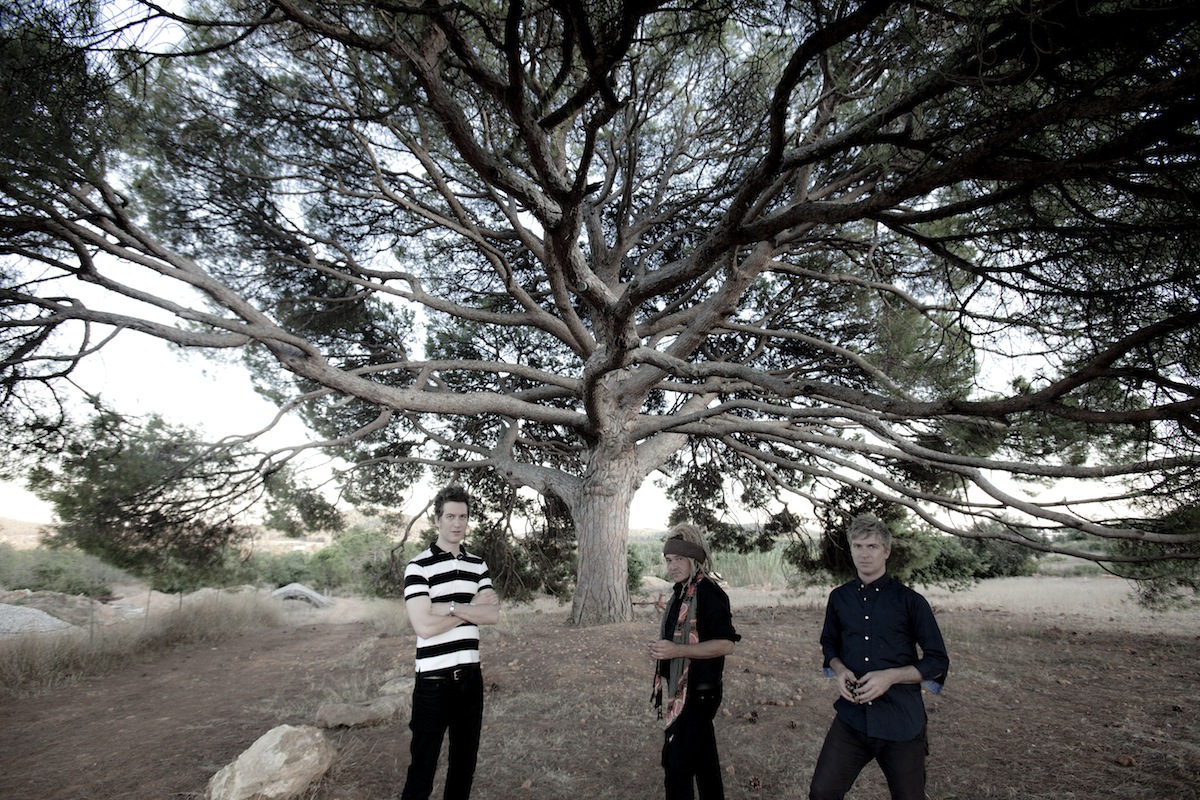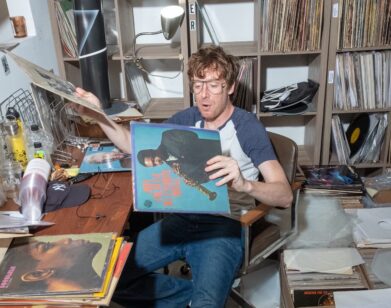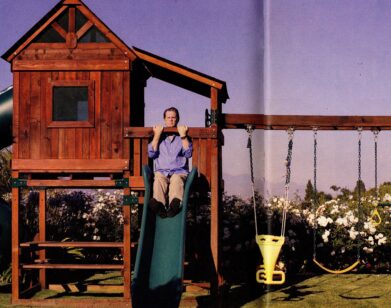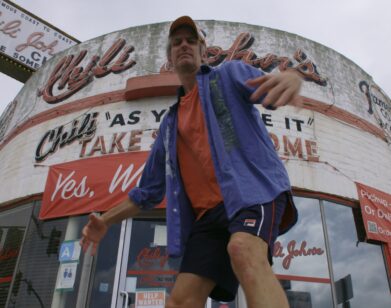Nada Surf Relives the Past

ABOVE: NADA SURF. PHOTO COURTESY OF JOSÉ DEL RIO MONS
Nada Surf has no shame when it comes to writing pop songs—lead singer Matthew Caws has come to accept that fact throughout the past 18 years of the band’s existence. After releasing seven albums, Nada Surf has explored every topic possible in their songwriting: love, heartbreak, indecisiveness, and more. With a variety of alternate versions of songs, new songs, and demos, Nada Surf decided to release B-Sides this week—a collection of digital rarities from and/or related to the band’s past four albums. Some gems from the record include an acoustic version of “I Like What You Say” from Lucky, the original version of “Concrete Bed” from The Weight Is A Gift, and “I Wanna Take You Home” with Juliana Hatfield.
Fans will be excited to hear that Nada Surf is working on a new record, though there aren’t too many details available right now. Nada Surf’s vocalist Matthew Caws spoke to us about his favorite Nada Surf album, being content with the band’s pop song structure, and the B-sides that have stuck with him over the years.
ILANA KAPLAN: What made you guys want to release these B-sides and rarities at this point in time?
MATTHEW CAWS: I made a record last year with Juliana Hatfield last year as Minor Alps. There’s a song called “Waiting For You” that’s an English translation of a Nada Surf B-side called “Je t’attendais” that Juliana really liked. She called me and was like, “What is this song? I really like this.” That’s how we ended up making it as Minor Alps songs—by translating and adding a lot of lyrics. One night I wanted to listen to it and I could only find it on YouTube, and the sound wasn’t that great. I looked on iTunes and I realized it wasn’t there. I called our manager and said, “So this B-side isn’t on iTunes, what can we do about that?” He said, “Well, let’s just put out a B-sides collection.” So it’s not a romantic story—it’s purely practical. It was like, these tracks don’t exist digitally, so let’s put them out. It’s not even exhaustive at all. It just happens to be the ones that were officially released. Right now, we’re making a new Nada Surf album. In a few years, I’m sure we’ll gather all of the weirder things that are the extra tracks we have lying around. This was just to make sure they were available. They were available as B-sides to some people, but we wanted to make sure they were available to everyone.
KAPLAN: So, are some of the tracks in this collection your favorite versions in comparison to the ones that were released on some of your records?
CAWS: Yeah. “From the Rooftop Down” is a B-side I remember really enjoying. I made it when we were doing The Weight Is A Gift. It was just four-tracking at home and making it up on the spot; it’s a little looser than something that would end up on a Nada Surf record. There’s a song called “Au fond du rêve doré,” which means “At the Bottom of a Golden Dream.” It’s a song by Françoise Hardy. She was a French folk-rock beatnik. She was a part of the yé-yé movement. It’s a song of hers I heard on an album I bought at a Salvation Army on the corner for 25 cents that I really liked. B-sides are always a little quirkier. I always like them as a special group of songs because they’re songs you didn’t want to put on the record for whatever reason, but you felt strongly enough to put out at all. Sometimes it’s even more interesting. I can’t make that judgment call from our point of view. I can only say we liked them enough to put them out, but they seemed different. “I Wanna Take You Home” was the basis of Minor Alps. Juliana asked me to sing on one of her songs, and I asked her to sing on this. We really liked the sound of our voices together, so that’s how that happened. I don’t know what else to say. I like B-sides. [laughs]
KAPLAN: So, you guys are working on a new record. How is this record going to be different than your previous ones, if at all?
CAWS: It’s a funny process that we go through every time we make a record. That question is asked quite rightly and indulgently by people like yourself; less intelligently by ourselves because we should know better. The fact is, we’re really a song-by-song band. In pop music, a lot of the time it’s all three minutes. Those three minutes are the beginning and the end of the whole idea. I guess it’s the first time that Doug Gillard, our lead guitar player, is involved in the beginning. He’s been in the practice studio while we’re writing. It’ll be more informed by his playing. I don’t think there’s a big philosophical change. I think we fake it every three years and say that there’s something. I guess on our last record, probably the best thing I could come up with was that I was trying not to write love songs anymore, but was trying to write more “out than in.” Instead of saying how do I feel, what do I see? I think that’s probably still true to an extent.
KAPLAN: How have you made your version of pop songs sound different over the years?
CAWS: You know how a lot of pop songs are the same three chords over and over again? I was very comfortable with that for a while. Being a fan of Sonic Youth and groups that were really harmonically rich, I was in denial about the fact that I write three-chord songs. I was always trying to dress them up and move my finger over one fret to make the chord weird. The fact is, the pop songs still have three chords. I finally made friends with that. Now I’m not bothered if it sounds complicated or not. I’m not insecure about it; I just don’t care. I do what I like to do, and if people like it they like it. That’s fine. I’m probably going through a similar process lyrically. I think all songwriters go through this, where you feel like you write the same two or three songs over and over again for decades. I think I’m trying to come to terms with that currently, relax, and write what I’m going to write without looking over my own shoulder. If that boils down to a soundbite about what’s going to make the record different, I don’t think it does.
KAPLAN: Out of all of the records Nada Surf has released, which has been your favorite and why?
CAWS: Well, Let Go generally seems to be most people’s favorite, which is not why I’m mentioning it. That one, because due to special circumstances, our second record got dropped. We had a lot of time on our hands and we were unsure where our career was going. We had two or three years to write that record. I was just working at a record store and hanging out, really. Basically, we got to make a first album all over again. The first album is the one you have all this time for because you’re building up to it. Your subsequent record you’re generally in a hurry. For Let Go, it was like having a whole incredibly rich period of sanctioned, low-pressure time. We had just enough of a career going that I couldn’t go to grad school or contemplate having an actual career in another field. I think would have been irresponsible. If I took a serious job knowing I might leave at any time to go on tour, that wouldn’t have been nice. There was not much I could do, but scrape by. I like Let Go for that reason. As far as other records go, I like Lucky a lot because the songs are really varied. It seemed like maybe we were reinventing ourselves a little bit. I’m saying this by our own standards and not by a truly adventurous group [laughs]. I think The Stars Are Indifferent To Astronomy was a lot of fun because we recorded it really quickly, kind of like our first album, so it had this immediate feeling to me. I would say that would be my answer.
NADA SURF’S B-SIDES IS OUT NOW. YOU CAN VISIT THE BAND’S FACEBOOK HERE.






